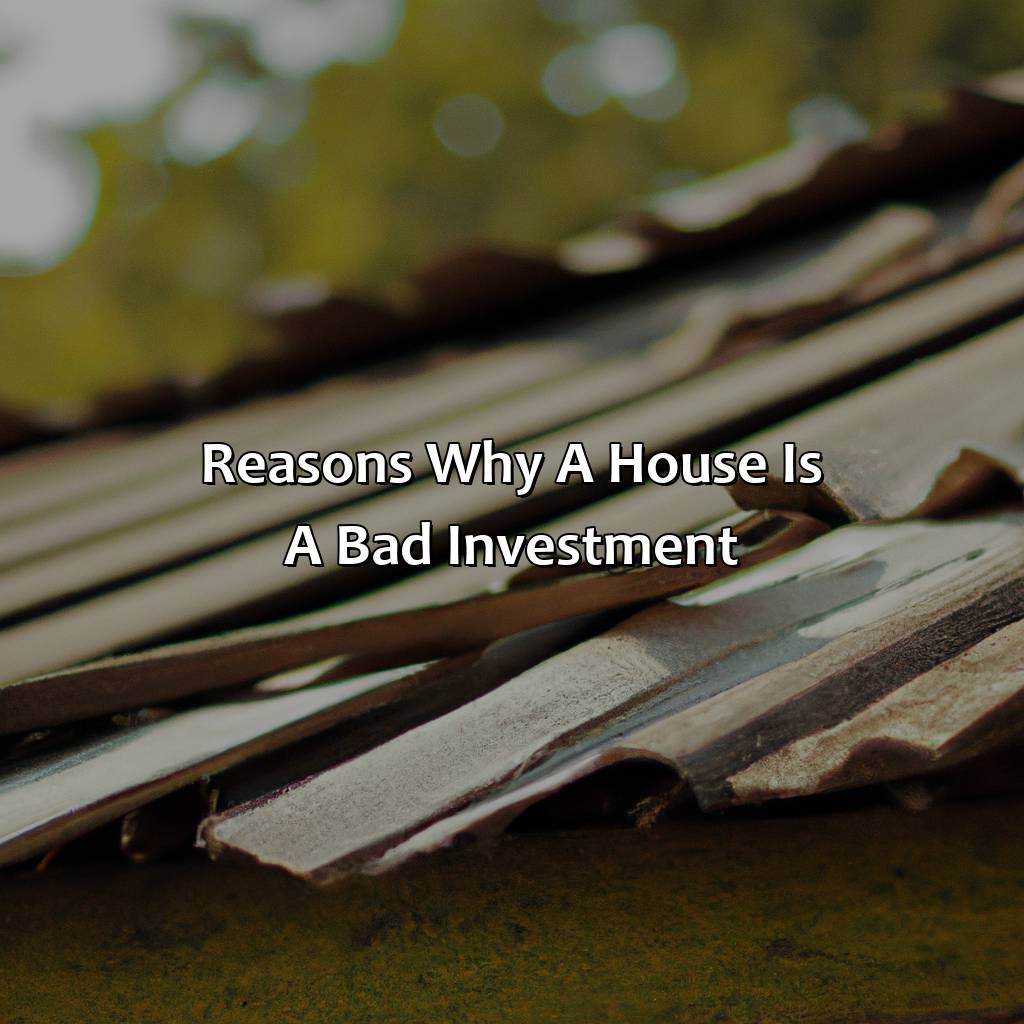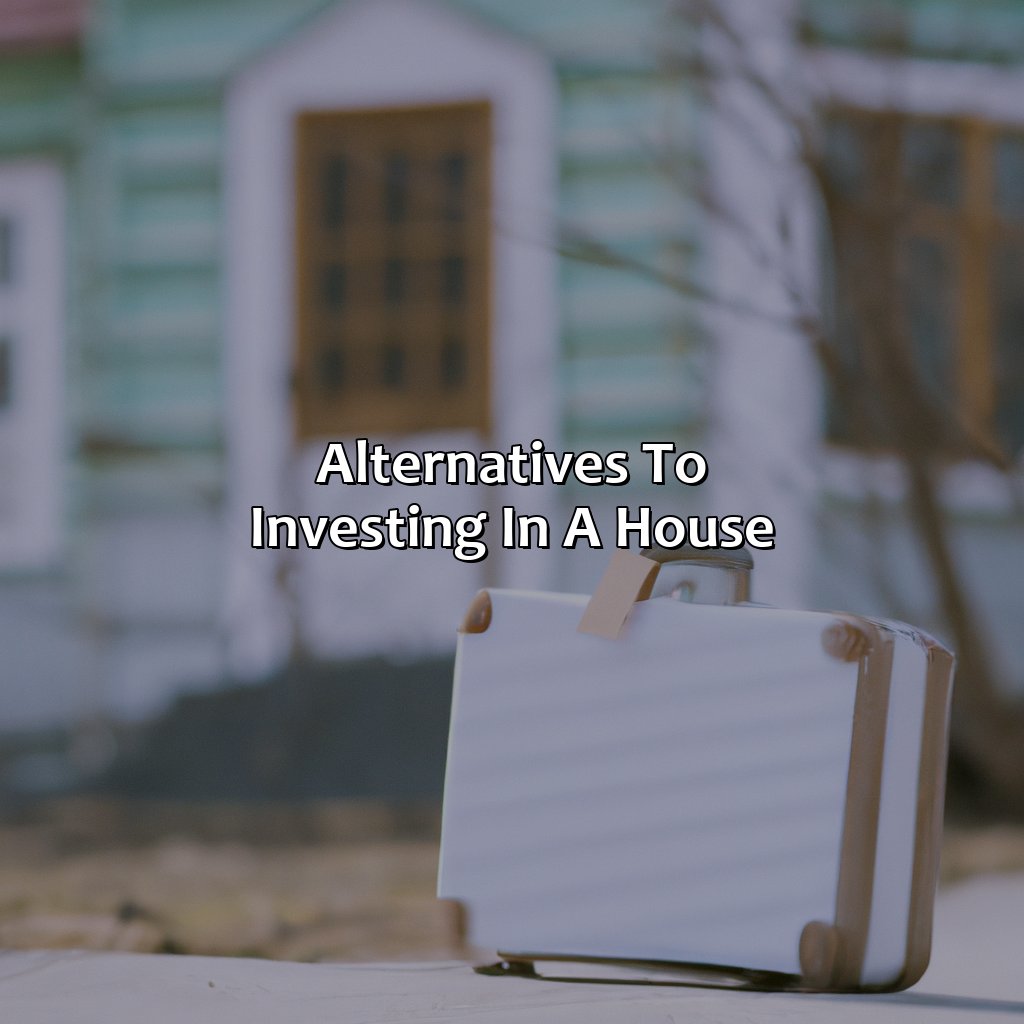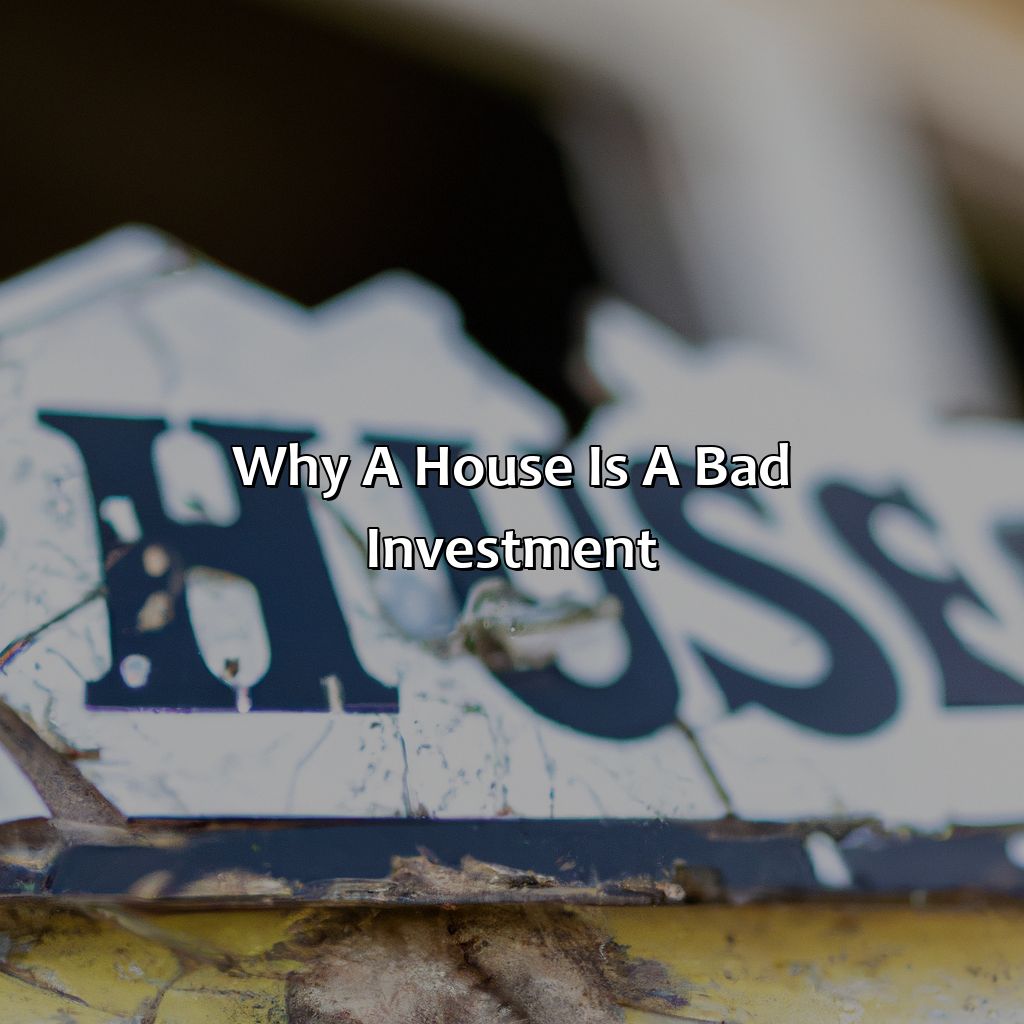Why A House Is A Bad Investment?
Key Takeaways:
- Investing in a house can be a bad investment due to the limited liquidity. Selling a house quickly can be problematic and time-consuming, tying up capital for long periods of time.
- The high transaction costs associated with buying and selling a house can eat into potential profits, making it an unattractive investment option.
- Houses require long-term commitment and maintenance costs, potentially decreasing profits and adding unexpected expenses.
- The uncertainty in the housing market can lead to potential loss of investments, as the value of houses can fluctuate without warning.
- The opportunity cost of tying up capital in a house can lead to missed investment opportunities in potentially high-yielding markets.
- Alternative investment options include stocks or mutual funds, rental properties or REITs, and starting or investing in a business.
Are you considering buying a home as an investment? Before you dive in, consider this: a house is often a bad investment choice. Investing in a home can be fraught with financial risks and unintended consequences. Read on to learn why a house is a bad investment.
Reasons why a house is a bad investment
Let’s take a crazy look at why a house is not a great investment! Limited liquidity, high transaction costs, a long-term commitment, maintenance costs, an uncertain housing market and the cost of tying up capital can all make investing in a house a risky option. We’ll check out these reasons below and see how they influence investing in property.

Image credits: retiregenz.com by David Woodhock
Limited liquidity
Real estate investments have restricted liquidity, which means that it may be hard to sell them quickly for cash. This is because the house is a physical asset and not like a stock or bond, where you can quickly convert it into cash by selling.
Moreover, the housing market may fluctuate frequently and, the value of your property may decrease suddenly or remain stagnant for an extended period, making it difficult to sell at a good price. In case of financial emergencies, your investment in real estate could be challenging to liquidate and require you to go through lengthy processes that might cause you significant losses.
It is essential to consider alternative investment choices with higher liquidity and lower transaction costs than investing in real estate. Consider investing in mutual funds and index funds as they offer greater flexibility regarding withdrawals while offering competitive returns. These types of investments are also typically easier to manage since they do not require substantial upkeep or ongoing expenses like property taxes and maintenance fees.
Buying a house is like getting a tattoo – it may seem like a good idea at the time, but the high transaction costs and potential regret make you wish you had just stuck with renting.
High transaction costs
The costs associated with buying and selling a property can be substantial, deterring many from doing so. These expenses, known as transaction costs, are often overlooked when calculating the potential return on investment of real estate. Inevitable closing fees, commissions paid to estate agents or brokers, taxes, surveying and inspection charges all contribute to these costs.
The high transaction costs in the housing market reduce net returns and increase risk for investors because they affect both purchases and sales of properties. Buyers have to come up with significant amounts of money upfront to pay for expenses such as attorney fees, appraisal costs, credit report charges and home inspection fees. Additionally, when selling a house, owners have to deal with real estate agent commission fees which can vary depending on location.
Furthermore, the cost of real estate fluctuates over time due to various economic factors affecting supply and demand making it difficult for individuals to predict future values correctly.
Pro Tip: Before buying or selling a house calculate all agent commissions side by side by comparing their performance metrics against the industry standards.
Owning a house is like being in a long-term relationship with high maintenance costs – except instead of a significant other, it’s a structure that can’t even say ‘I love you back’.
Long-term commitment and maintenance costs
Owning a residential property presents long-term responsibilities and financial obligations that require careful consideration. Sitting with maintenance costs and being committed to a property for an extended period can impact your finances and lifestyle. This is why homebuyers should weigh their options to ensure they are making the right choice.
Regular maintenance is essential, such as repairs, cleaning, and landscaping, involving time and expense; these vary depending on the size of the house. Leaky roofs, faulty plumbing issues can be identified during routine maintenance checks that can further increase expenses. Therefore, one needs to bear in mind that purchasing a home comes with a sense of responsibility towards its upkeep.
Furthermore, it’s worth noting that regular mortgage payments could lock you into a particular location for an extended period if you cannot afford to move or sell it quickly. As life situations change over various years, owning a property may not offer the flexibility and mobility one needs in evolving economic circumstances.
One suggestion would be opting for renting instead of buying when weighing various housing options based on affordability and personal living preferences. Though this approach may have its drawbacks later concerning increasing rental rates or lack of ownership rights, it provides excellent flexibility while saving money long-term. Alternatively, considering building your own house from scratch provides freedom in designing space according to desired specifications at potentially lower costs compared to purchasing a pre-existing structure.
Owning property requires a lifelong commitment involving considerable upkeep expenses beyond the initial purchase price that could limit future financial decisions affecting lifestyle choices. Henceforth, one must carefully decide whether purchasing a home aligns with personal circumstances financially and emotionally before signing off buying contracts.
Investing in the housing market is about as predictable as a coin toss, but with less exciting outcomes.
Uncertainty in the housing market
The unpredictability in the housing industry has been a significant concern for potential homeowners. The unstable market conditions have made it challenging to predict future returns on your investment, which poses a high level of risk. One of the main concerns is the possibility of interest rates rising, which can lead to increased mortgage payments and less affordability. This uncertainty in the housing market makes it challenging for prospective buyers to make informed decisions.
Another factor for uncertainty is unforeseen events such as natural disasters or pandemics that can decrease property values. For example, during the COVID-19 pandemic, many people lost their jobs, causing mortgage delinquencies to surge and forcing homeowners to sell their houses at lower prices than expected. Additionally, the expenses associated with maintaining a home such as repairs and renovations add onto the uncertainties that come with owning a house.
Despite its popularity as an investment avenue, many stories exist where people have purchased homes that have ultimately led them to financial ruin. In one instance, a family bought a house assuming they would be able to sell it at a higher price in two years but were faced with financial difficulty when they were unable to sell for several years due to poor market conditions.
In summary, owning a house may appear like an excellent decision financially; however, many unpredictable factors lead it to be deemed as an uncertain investment option.
Buying a house is like playing a game of Monopoly, except instead of passing go and collecting $200, you tie up all your capital in a single property.
Opportunity cost of tying up capital
Investing in a house has an opportunity cost of tying up capital, which means that the money invested in a property cannot be used elsewhere. This is especially relevant for young and dynamic individuals who might have other investments like a business or stocks. By purchasing a house, they may miss out on these other investment opportunities.
Moreover, tying up all the capital in a single asset can reduce diversification and therefore expose investors to higher risks. For instance, if the property market declines or values drop around the neighbourhood, one’s entire capital can be affected.
Besides reducing the diversification of investments and missing other investment opportunities, having all the capital tied up in real estate reduces liquidity as well. Selling a house can take some time, and in certain situations where there is high demand for liquid cash due to personal circumstances, this can prove to be very inconvenient.
According to Bankrate UK research study of 2021, only 30% of homeowners believed their houses were good financial investments.
Who needs a mortgage when you can have a whole lot of avocado toast?
Alternatives to investing in a house
Why a house is a bad investment? Let’s explore some alternatives! Investing in stocks or mutual funds could be more profitable. Or you could invest in rental properties and REITs. Another option is to start a business or invest in one.

Image credits: retiregenz.com by Adam Washington
Investing in stocks or mutual funds
Investing in securities or pooled investments:
- Stocks and mutual funds offer a diverse portfolio and potential for higher returns than real estate.
- Investors have the flexibility to buy or sell shares instantly with low transaction costs.
- There are many types of stocks and mutual funds, each with different risks and rewards.
- Professional management ensures investments are optimized for maximum gains.
Moreover, investing in securities or pooled investments can provide passive income through dividends or capital gains. Unlike physical property, stocks and mutual funds require little to no maintenance while still generating significant returns.
Consider diversifying your portfolio by investing in different types of securities or pooled investments like ETFs. This can help hedge against market volatility and inflation.
In summary, instead of solely investing in a house, consider exploring the benefits of investing in securities or pooled investments like stocks or mutual funds. With professional management and potential for high returns, they may offer a more reliable path to wealth creation.
Why own just one property when you can own multiple headaches with investing in rental properties or REITs?
Investing in rental properties or REITs
Investing in properties for rent or Real Estate Investment Trusts (REITs), an advantage in the property market.
- Investing in rental properties can generate passive income and capital appreciation.
- Investing in REITs offers diversification, liquidity, and professional management.
- Both options provide tax benefits such as deductions.
- In rental properties, you have control over the investment, whereas REIT market value is dependent on external factors such as interest rates.
- Expenses such as repairs, vacancies and maintenance can have a significant financial impact on managing a rental property portfolio but REIT investors don’t need to worry about these costs.
- The decision between rental properties or REITs ultimately depends on individual preferences and goals.
When deciding which option to pursue, consider research that shows the average annual return of REITs is higher than other asset classes.
It’s true – according to Forbes, “Real estate has long been seen as a valuable asset class that offers stable returns“.
Starting a business is like jumping off a cliff and building a parachute on the way down.
Starting a business or investing in a business
For financial growth, exploring varied investment options is essential. One such option is starting or investing in a business. The prospects for returns are high, but the risks are also on the higher side.
Starting a business involves creating, managing and developing an enterprise to generate income, while investing in a business means providing capital for ownership or profit-sharing without being directly involved in its operations.
Investing capital in an existing business tends to offer some level of stability since one can assess past performances and potential risks before committing funds. On the other hand, starting a business brings greater risk and takes more effort upfront, with no guarantees of success.
It’s important to assess both options’ viability by researching various industries’ potential markets and competitors thoroughly. Seek expert advice from trusted sources like lawyers and accountants while developing a clear understanding of finances, legal requirements, taxes, and permits.
Pro Tip: When investing in a business or starting one for financial gain, don’t forget to address cybersecurity issues as you manage other operational objectives. Protecting against cyber threats is increasingly necessary for businesses today due to rising cases of online frauds and identity thefts.
Five Facts About Why a House Is a Bad Investment:
- ✅ A house requires constant maintenance and upkeep, adding to the overall cost of ownership. (Source: The Balance)
- ✅ The housing market is subject to fluctuations and crashes, making it a risky investment. (Source: Investopedia)
- ✅ The return on investment for a house is typically lower than other investment options, such as stocks or mutual funds. (Source: Forbes)
- ✅ Owning a house can limit mobility and job opportunities. (Source: CNBC)
- ✅ Property taxes and insurance can also add significantly to the cost of owning a house. (Source: The Motley Fool)
FAQs about Why A House Is A Bad Investment?
Why is a house a bad investment?
While a house may seem like a great investment, there are several reasons why it may not be the best financial decision. Firstly, the housing market can be unpredictable, and a downturn could lead to decreased home values. Additionally, owning a home can come with significant expenses such as property taxes, repairs, and maintenance. Lastly, tying up a significant amount of money in a single asset can limit your investment diversification.
What are some alternative investments that may be better than a house?
There are several investments that may be better than a house in terms of financial return and diversification. These include stocks, bonds, and mutual funds. Additionally, investing in real estate investment trusts (REITs) can provide exposure to the real estate market without the high costs and responsibilities of owning property.
Is it ever a good idea to buy a house as an investment?
While there are risks associated with buying a house as an investment, there are also potential benefits. If the housing market remains stable or experiences growth, owning a home can provide a significant return on investment. Additionally, renting out the property can generate rental income. However, it’s important to carefully consider the costs and responsibilities before making a decision.
What should I consider before buying a house as an investment?
Before buying a house as an investment, it’s important to consider several factors. These include the current state of the housing market, the potential for rental income, the costs and responsibilities of owning the property, and the potential for appreciation in value. It’s also important to have a solid understanding of the legal and financial considerations involved in owning and renting property.
How can I minimize the risks associated with buying a house as an investment?
To minimize the risks associated with buying a house as an investment, it’s important to perform thorough research into the housing market and the property itself. This includes analyzing the location, neighborhood, and potential rental income. Additionally, it’s important to carefully review the legal and financial considerations involved in owning and renting property and to have a solid understanding of the costs and responsibilities of ownership.
Are there any tax benefits of owning a house that make it a good investment?
While owning a house can come with potential tax benefits such as deductions for mortgage interest and property taxes, these benefits may not outweigh the costs and responsibilities associated with ownership. Additionally, tax laws and benefits can change, making it important to regularly review the financial implications of owning a house as an investment.


